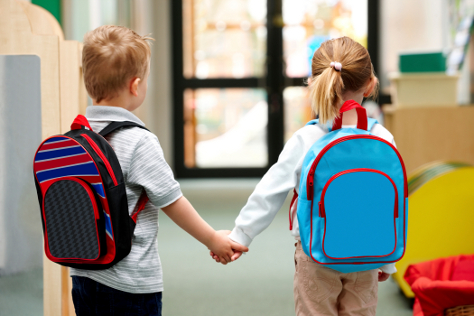How to support learning and development pre-school
There’s a lot you can do to get your child ready for school

As well as helping with words and numbers, there's a lot you can do to get your child ready for school. Play offers children a range of skills they will need when they start school so that they can understand their needs and other people's needs.
Learning comes naturally to babies and young children. Day by day they are growing physically, emotionally, socially and mentally, developing their intelligence and understanding about the world around them. Parents, and other family members, play a vital role in helping young children learn as they are a child’s first teacher.
How to support young children’s learning and development
Talk and sing to children from day one. It will help them develop their memory of sounds and later of words. Be guided by the child and observe what she or he is able to do and encourage them gradually to build on what they are able to do.
Accept that each child grows and develops at his or her own pace. Avoid comparisons with other children and try not to put a child under pressure to do anything she or he is not ready to do. This applies equally to walking, to potty training and to reading. Encourage reading and talk about the pictures in books and read to your child from an early age. Encourage them by having books, magazines and newspapers in the home. Let them see you and other family members reading them. Pointing to and saying words as you travel together in parks, in shops, etc. also helps.
Feed children’s natural curiosity and give toddlers and young children a variety of safe and interesting objects to explore. Play with your children sometimes as it is an opportunity to show your interest and delight in their discoveries and achievements. Try to give toddlers and young children space to enjoy physical movement and games. This includes running, skipping, climbing, playing ball games in parks and playgrounds or your garden. Use creative play to help them develop their abilities and skills.
Consider joining parent and toddler groups, children centres, playgroup or a toy library. These too are good places to meet other parents and help a child develop social skills in readiness for school. It is important to enjoy everyday activities together. These are opportunities to talk about things, name them and identify words.
Learning through play
Play is one of the main ways in which children learn. It helps to build self-worth by giving a child a sense of his or her own abilities and to feel good about themselves. Because it’s fun children often become very absorbed in what they are doing. In turn, this helps them develop the ability to concentrate. Providing children with a range of playthings will help learning in a number of ways.
How young children learn
Children learn through all their senses by tasting, touching, seeing, hearing and smelling. By watching and copying people close to them, they learn language and behaviour. Through touching, exploring and looking at shapes and textures of objects they develop their ability to distinguish different shapes. Later, this helps them learn to do things, such as reading, when they identify the different shapes of letters. Above all they learn through playing.
Helping a child develop confidence and self-worth
One of the best ways to help children feel valued is to listen to them and let them know when they are doing something well. In addition, try to avoid doing everything for children. As they develop, let them experiment and work things out for themselves, even if it means that they make mistakes sometimes, such as putting clothes on the wrong way, etc. This helps them develop independence and confidence in their abilities.
As a child develops, she or he needs to be shown clear boundaries, i.e. to be told and show what behaviour is and is not acceptable and why. Sometimes, children may develop a pattern of being naughty if they get attention only why they are mischievous. Try to let them know when they are doing things well and at other times, aim for a firm and gentle approach. If using a child minder, make sure your child minder is able to use this approach too as well as providing a stimulating environment in which your child can play.
Was this information useful?
Bounty is proud to bring you this information in partnership with www.familylives.org.uk. Family Lives is a charity with over three decades’ experience helping parents to deal with the changes that are a constant part of family life.
Comments on this article are monitored but NOT answered. However, Family Lives has extensive advice on their website, live chat services, and information about befriending services and parenting/relationship support groups. There is also a helpline and an online community forum offering a safe space for families to share dilemmas, experiences and issues with others who understand the ups and downs of family life. https://www.familylives.org.uk/how-we-can-help/forum-community/